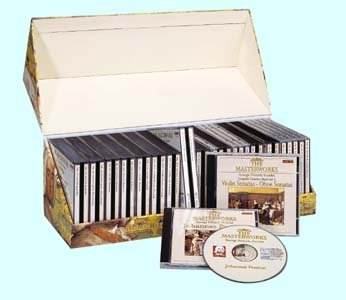The original version of ‘Acis and Galatea’ was
written for just five singers and a small instrumental ensemble.
It was written for the Earl of Carnarvon (later the Duke of Chandos)
for performance at his establishment. We know precious little
about the origins of this work. Dating from 1718, both ‘Acis and
Galatea’ and the oratorio ‘Esther’ (also written for the Duke
of Chandos for similarly small forces) would become important
in the development of English oratorio. But at the time of writing
they were just occasional works and no-one recorded much about
their genesis. The libretto for ‘Acis and Galatea’ is at least
partly attributable to John Gay who was a member of a group of
writers associated with the Duke of Chandos and the Earl of Burlington.
Later on, Handel would re-work ‘Acis and Galatea’
as a serenata for performance in London. These later versions
were generally bilingual and often included material from his
earlier Italian cantata, ‘Aci, Galatea e Polifemo’. The present
recording uses the original 1718 version, which is arguably the
most satisfactory of Handel’s versions of this piece. There is
much to be said for the intimacy of a small-scale performance,
with one player to a part and a chorus made up of the principals,
especially when the performers show a keen feeling for Handel’s
style. Unfortunately, on this recording the piece is given by
rather larger forces. Though the performance gains in power and
dramatics, it loses severely in terms of Handelian style and feeling.
The orchestra, The Ama Deus Ensemble, play the
overture crisply if a little robustly, but I felt that the balance
was wanting and the strings dominated the oboes rather too much.
In the opening chorus the choir sound too large and the performance
is too heavy and too loud. Larger forces do not preclude a chamber
feel to the piece, but here no attempt seems to have been made.
The conductor, Valentin Radu, has a rather large scale concept
of the piece and seems to be happy to let his forces perform with
minimal intervention. The performance would certainly have benefited
from a little more shaping to some of the numbers. Radu’s tendency
to set a tempo and let it run in a very 4-square manner is not
helpful to either the piece or the performers.
The instrumental playing is not always up to
scratch, there are tuning problems and in Galatea’s first aria
the violin and recorders can sound scrappy. This is a shame as
Julianne Baird, as Galatea, is one of the best things on the disc.
She sings in a beautiful shapely manner and her distinctive plangent
tones are apt for the part. From the first moment she opens her
mouth you know that it will end in tears. Her way with recitative
is equally as attractive and her horrified dialogue with Polyphemus
in Act 2 is a high point of the performance.
As Acis, Frederick Urrey has an attractive tenor
voice, but his tendency to apply vibrato to notes means that each
note sounds squeezed and this spoils any sense of line. His approach
to the part is more successful in Act 2 when Acis is required
to sound more martial. In fact, the whole recording is more successful
in Act 2 where the necessary dramatics disguise the lack of style
which is prevalent in Act 1.
Polyphemus is, to some extent, a pantomime villain
but he must appear to be in love and Handel gives him a fine opening
aria, ‘O ruddier than the Cherry’. Kevin Deas sings it in a heavily
staccato manner which makes it sound heavy and laboured. There
is no sense of lightness and shape, not helped by Deas’ singing
being constantly too loud.
As Damon, the character who keeps popping up
with sensible advice, David Price gives hints of unsteadiness
and seems a little uncomfortable with the high tessitura. All
the notes are there but the arias fatally lack a feeling for shape
and style.
Acis and Galatea has not fared particularly well
on record. Sir John Eliot Gardiner’s version made in 1976 long
held the field, and to some extent still does, although Robert
King’s smaller-scale reading has many virtues too. William Christie’s
version may not be to everyone’s taste but it is a polished and
strongly characterized performance, finely recorded, and is certainly
the first I would urge anyone to try. For a budget recording,
it is worthwhile looking at Naxos. Here the Scholars Baroque Ensemble
recorded the 1718 version with genuine chamber forces. The performance
is marred mainly by a misguided decision to transpose Polyhemus
from tenor to alto.
Robert Hugill
